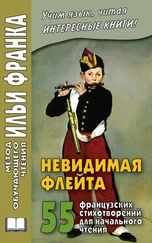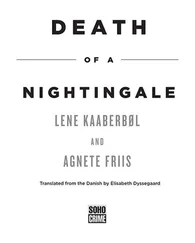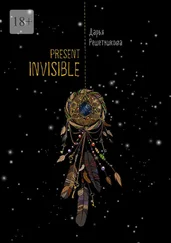Lene Kaaberbol - Invisible Murder
Здесь есть возможность читать онлайн «Lene Kaaberbol - Invisible Murder» весь текст электронной книги совершенно бесплатно (целиком полную версию без сокращений). В некоторых случаях можно слушать аудио, скачать через торрент в формате fb2 и присутствует краткое содержание. Год выпуска: 2012, ISBN: 2012, Издательство: Soho Crime, Жанр: Старинная литература, на английском языке. Описание произведения, (предисловие) а так же отзывы посетителей доступны на портале библиотеки ЛибКат.
- Название:Invisible Murder
- Автор:
- Издательство:Soho Crime
- Жанр:
- Год:2012
- ISBN:9781616951719
- Рейтинг книги:5 / 5. Голосов: 1
-
Избранное:Добавить в избранное
- Отзывы:
-
Ваша оценка:
- 100
- 1
- 2
- 3
- 4
- 5
Invisible Murder: краткое содержание, описание и аннотация
Предлагаем к чтению аннотацию, описание, краткое содержание или предисловие (зависит от того, что написал сам автор книги «Invisible Murder»). Если вы не нашли необходимую информацию о книге — напишите в комментариях, мы постараемся отыскать её.
Invisible Murder — читать онлайн бесплатно полную книгу (весь текст) целиком
Ниже представлен текст книги, разбитый по страницам. Система сохранения места последней прочитанной страницы, позволяет с удобством читать онлайн бесплатно книгу «Invisible Murder», без необходимости каждый раз заново искать на чём Вы остановились. Поставьте закладку, и сможете в любой момент перейти на страницу, на которой закончили чтение.
Интервал:
Закладка:
He hadn’t made a good impression. And he didn’t understand how Lujza could sit there next to him, seemingly happy and content, and kiss him on the cheek.
They pulled onto Szív Street and suddenly had to slow down. A crowd of pedestrians was crossing without looking, as though normal traffic rules didn’t apply. The driver edged the cab forward through the crowd and tried to pull out onto Andrássy Avenue, but that proved impossible. The entrance to the wide boulevard was blocked by a handful of police officers and a temporary barricade, and there were people everywhere, both in the road and on the sidewalks. When the driver tried to back up, it was too late. The crowd had closed around the cab like a fist. The driver opened his door a little and got halfway out.
“Hey,” he called out to the closest officer manning the barricade. “What’s going on?”
The officer glanced over his shoulder. When he noticed the taxi sign on the cab’s roof, he raised his hand in a sort of semicollegial greeting between two professionals. “A demonstration,” the officer yelled back. “We’ll open up for traffic once it’s passed.”
The cab driver sank back into his seat again, shut his door, and re-locked it. “Sorry,” he said. “We have to wait.”
He rolled the windows down, just enough to let some air into the cab and then turned off the engine. “No point in wasting gas,” he said. “We’re not going anywhere for a bit.”
Through the open windows, Sándor could now hear the sound of drums and rhythmic chants. He couldn’t help speculating on how much the fare would be. Even though the engine was off, the meter was still running.
“Maybe we should just walk the rest of the way?” he suggested. “Or take the subway?”
“I’m wearing heels,” Lujza objected.
The sound of the drums got louder; the demonstration was approaching. It was coming down Andrássy Avenue from Heroes’ Square, he reckoned. He couldn’t see much from inside the cab, but now he could hear what they were yelling.
“Save Hungary now! Save Hungary now!”
Involuntarily, Sándor slid down a couple centimeters in his seat. Jobbik. It had to be Jobbik, taking to the streets again to protest the Jews, Communists, and Romas “ruining our proud nation.”
“Them,” said Lujza, pursing her lips as though she had found something disgusting on the bottom of her shoe. “God spare us from any more racist, goose-stepping idiots.”
The driver turned in his seat and gave Lujza the same suspicious look he had given Sándor at the beginning of the ride.
“Jobbik aren’t racists,” he said. “They’re just for Hungary.”
Oh no, Sándor thought. Please don’t make an issue of it.
It was a doomed hope. Lujza straightened herself up in her seat and stared daggers at the driver, 128 pounds of indignant humanism versus 260 pounds of overweight-but-muscular nationalism.
“And what kind of Hungary would that be?” she asked. “A Hungary clinically scrubbed of all diversity? A Hungary where you can be arrested just because your skin is a different color? A Hungary where it’s totally okay for Romas to have a life expectancy that’s fifteen years shorter than the rest of the population?”
“If they want to live longer, they can quit drinking themselves to death,” the driver said. “And spreading diseases to the rest of us.”
“Where do you get that rubbish from? HIR TV?”
“Well, someone has to tell the truth if the government’s not going to,” the driver said. “I’d like to see you try driving a taxi in Budapest at night—the whole place is controlled by Gypsy gangs. They’ll stab you if you so much as blink. They’re worse than animals.”
Lujza yanked a handful of ten thousand forint bills out of her purse and tossed them on the seat. “Here,” she said. “We’re getting out right now!”
The driver obviously agreed. The power locks clicked pointedly open.
“Bitch,” he snarled. “Get out of my cab, and take your dirty Gypsy dog with you.”
Lujza flung the door open and jumped out. Sándor remained paralyzed for a few seconds, his skin tingling as though the driver’s words had struck him physically. His throat had closed up, and in any case, he couldn’t think of anything to say.
“Come on , Sándor,” snapped Lujza.
He fumbled his door open and climbed out into the middle of the street, into a throng of people pushing their way toward the police barricade.
“But your shoes,” he managed to say. “Your heels.…”
“I’d rather walk the whole way to Tavaszmezö in my bare feet,” Lujza hissed. And then she burst into tears. He had to inch his way through the crowd around the now re-locked cab to reach her. He just wanted to get away—away from the yelling and drumming and red-and-white striped banners that were approaching. The shouts rumbled over their heads, from the demonstrators as well as from the scratchy loudspeaker mounted on a car in the demonstration:
“Save Hungary now! Save Hungary now!”
Lujza was obviously planning to follow through on her threat. She was standing on one leg, pulling her high-heeled shoe off her other foot. She looked so small and vulnerable in her sleeveless, cream-colored summer dress. Her white silk shawl had slipped down over one shoulder, and her neck looked strangely exposed because she was wearing her long, light-brown hair up with a couple of white silk flowers in honor of the day’s festivities. Sándor wanted to stop her. He couldn’t bear the thought of her small, naked feet among all the stomping, trampling boots and shoes. She had no idea how dangerous this was, and her fearlessness frightened him.
“Goddamn fascists!” she said, tears streaming down her lightly powdered cheeks. “It’s unbearable that there are so many of them.” She leaned on him as she angrily tugged off her second shoe.
“Put them back on,” he begged. “What if you step on a piece of glass?”
She seemed not to hear him.
“Narrow-minded idiots who get their so-called information from nationalist TV propaganda. How can we let them march in our streets wearing their silly uniforms? Haven’t we learned anything?”
“Shhh,” he hushed her instinctively.
“You’re shushing me?” She shot him an indignant look.
“You never know.…” he began, and then stopped himself. It would only serve to enrage her even further.
“Are you scared?” she asked. “Are you scared of them?”
Well, yes, he was.
“He called you a dirty Gypsy.” She pointed angrily at the cab driver, who luckily had stayed in his cab, entrenched behind the green Mercedes doors. “Just because you have dark hair! You don’t even look like a Roma.”
He just mumbled, “No.”
“Well, you can’t let them get away with that kind of thing.”
“No,” he mumbled, hoping his lack of opposition would end the discussion.
Suddenly the crowd stumbled in unison—a wave of people falling, people trying not to fall, and people who just wanted to get out of the way. Sándor pulled Lujza in against him, struggling to keep them both upright. They were pushed back against the cab, and that was probably the only thing that saved them from falling. One of the barricades had tipped over, and there was some sort of scuffle up ahead between the police in their neon-green vests and black helmets and a small group of young people trying to get onto Andrássy Avenue. They looked like disaffected teenagers with punk hair, hooded jackets, and torn and saggy pants that revealed too much of their underwear. They were carrying a banner that said, “NO RACISM. FUCK FACISM.” Inside the O and the U, big round holes had been cut through the material.
Sándor could suddenly see the actual demonstration through the gap caused by the commotion. Long, straight lines of marching men and women dressed in white shirts, black pants and black vests, with red-and-white striped bandanas around their necks and garrison caps with red-and-white emblems on them. They looked oddly like folk dancers, harmlessly candy-striped and chubby-cheeked—not emaciated skinhead fanatics with brass knuckles and eyes brimming with hate.
Читать дальшеИнтервал:
Закладка:
Похожие книги на «Invisible Murder»
Представляем Вашему вниманию похожие книги на «Invisible Murder» списком для выбора. Мы отобрали схожую по названию и смыслу литературу в надежде предоставить читателям больше вариантов отыскать новые, интересные, ещё непрочитанные произведения.
Обсуждение, отзывы о книге «Invisible Murder» и просто собственные мнения читателей. Оставьте ваши комментарии, напишите, что Вы думаете о произведении, его смысле или главных героях. Укажите что конкретно понравилось, а что нет, и почему Вы так считаете.












